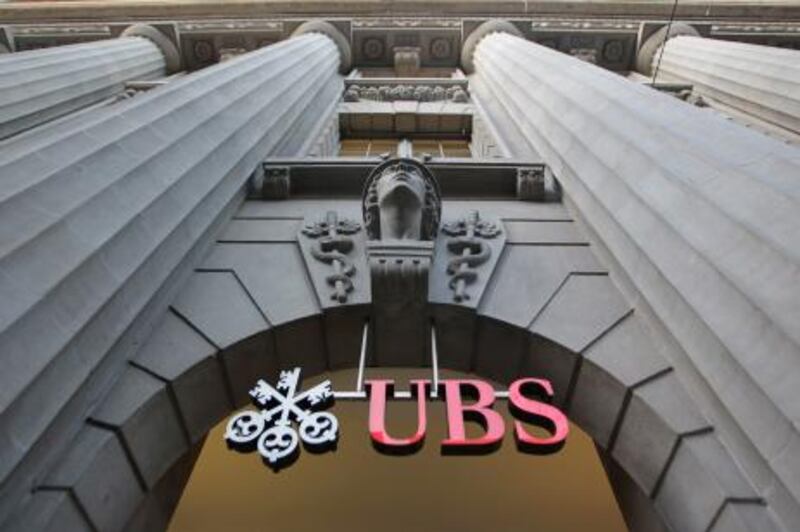UBS, Switzerland’s biggest bank, may be unprofitable in the third quarter after a US$2 billion (Dh7.34bn) loss from unauthorized trading at its investment bank. London police arrested a 31-year-old man on suspicion of fraud.
UBS management aims to “get to the bottom of the matter as quickly as possible, and will spare no effort to establish exactly what has happened,” the bank’s group executive board, led by Oswald Gruebel, the chief executive, said in a memo to employees today. “While the news is distressing, it will not change the fundamental strength of our firm.”
The bank tumbled as much as 9.6 per cent in Swiss trading following the announcement, which deals a blow to Gruebel’s attempts to revive the investment bank after the division recorded 57.1 billion Swiss francs (Dh239.93bn) in cumulative pretax losses in three years through 2009. The trading loss may revive calls for Gruebel to shrink or shut the unit.
“How many times do we have to see huge UBS losses?” said Simon Maughan, the head of sales and distribution at MF Global Ltd in London. “It looks unreformed, unwieldy and ultimately unsustainable. This could be a critical tipping point for UBS’s strategy.”
UBS fell 79 centimes, or 7.2 per cent, to 10.14 francs by 11.43am in Zurich, bringing the drop this year to 34 percent.
UBS said in a statement the matter is still under investigation, and that the “current estimate of the loss on the trades is in the range of $2 billion.” No client positions were affected, UBS said, declining to comment further.
An unidentified 31-year-old man was arrested in central London at 3.30am on “suspicion of fraud by abuse of position,” the police said in a statement. The man remains in custody and an investigation has been started, the statement said.
Switzerland’s Neue Zuercher Zeitung newspaper, citing the bank, reported that the trading loss took place in the equities unit in London, and was discovered yesterday afternoon. UBS spokeswoman Tatiana Togni declined to confirm or deny the report.
UBS had to raise more than $46 billion in capital from investors, including the Swiss state, to make up for the record losses during the credit crisis. The investment-banking unit had pretax earnings of 1.21 billion francs in the first half of 2011, while UBS as a whole had net income of 2.82 billion francs in the period.
The bank’s tier 1 capital at the end of the second quarter was 37.39 billion francs, giving it a tier 1 capital ratio of 18.1 percent, compared with 14 percent at Deutsche Bank AG, Germany’s biggest bank.
While the loss is “manageable” for UBS, it’s “obviously not helpful for sentiment and confidence in the bank’s risk management following the near-death experience of 2008-2009,” said Andrew Lim, a London-based analyst at Espirito Santo Investment Bank, in a note. Lim had estimated third-quarter net income of 1.1 billion francs for UBS.
UBS last month said it will eliminate about 3,500 jobs, with about 45 percent of the reductions coming from the investment bank, as strictercapital requirements and market turmoil hurt the earnings outlook. The bank in July scrapped the target of doubling pretax profit from last year’s level to 15 billion francs by 2014.
Gruebel, 67, and Carsten Kengeter, 44, who runs the investment bank, have been trying to revive earnings at the division for two years. They hired more than 1,700 people across the investment bank and brought in new business heads to replace those that left or were fired. They’ve also increased risk- taking to improve earnings opportunities.
The investment bank last had a pretax loss in the third quarter of 2010 when what Gruebel called “very low levels of client activity” and a charge related to the bank’s own debt hurt revenue at the division.
Gruebel, who formerly ran Credit Suisse Group AG, was brought out of retirement by UBS in February 2009 to take over from Marcel Rohner after the company posted the biggest annual loss in Swiss corporate history. A former bond trader, Gruebel doubled profit at Credit Suisse between 2004 and 2006.
UBS isn’t alone in suffering from unauthorized trading. Societe Generale of Paris said in January 2008 that the bank lost €4.9bn (Dn24.84bn) after trader Jerome Kerviel took unauthorized positions on European stock index futures.
Credit Suisse, Switzerland’s second-biggest bank, had a loss in the first quarter of 2008 in part because of writedowns on debt securities that were intentionally mispriced by a group of traders. Nick Leeson piled up $1.4 billion of losses that brought down Barings Plc in 1995.
Bloomberg News





